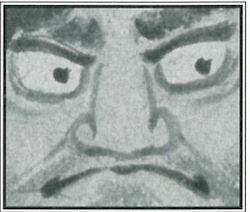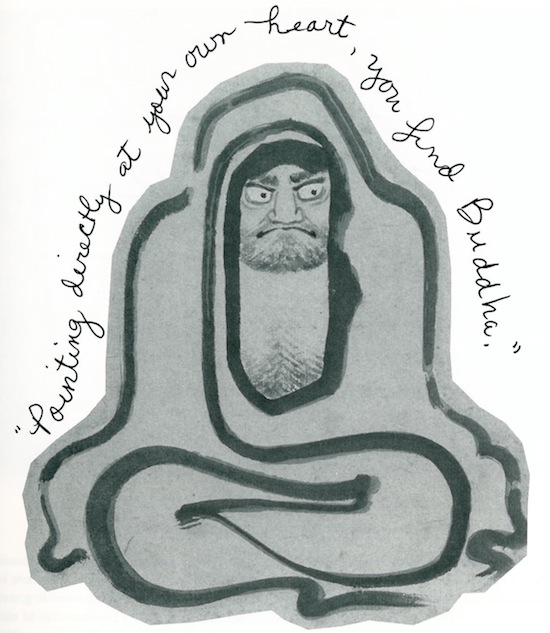
IN MY OFFICE THERE IS A SCROLL with Japanese calligraphy and a painting of Zen master Bodhidharma. Bodhidharma is a fat, grumpy-looking man with bushy eyebrows. He looks as if he has indigestion. The calligraphy reads, “Pointing directly at your own heart, you find Buddha. “
Bodhidharma brought Zen Buddhism from India to China. He was well known for being fierce and uncompromising. There is a story about how he kept nodding off during meditation, so he cut off his eyelids. When he threw them on the ground, they turned into a tea plant, and then he realized he could simply drink the tea to stay awake! He was uncompromising in that he wanted to know what was true, and he wasn’t going to take anybody else’s word for it. His big discovery was that by looking directly into our own heart, we find the awakened Buddha, the completely unclouded experience of how things really are.

In all kinds of situations, we can find out what is true simply by studying ourselves in every nook and cranny, in every black hole and bright spot, whether it’s murky, creepy, grisly, splendid, spooky, frightening, joyful, inspiring, peaceful, or wrathful. We can just look at the whole thing. There’s a lot of encouragement to do this, and meditation gives us the method. When I first encountered Buddhism, I was extremely relieved that there were not only teachings, but also a technique I could use to explore and test these teachings. I was told from day one that, just like Bodhidharma, l had to find out for myself what was true.
However, when we sit down to meditate and take an honest look at our minds, there is a tendency for it to become a rather morbid and depressing project. We can lose all sense of humor and sit with the grim determination to get to the bottom of this stinking mess. After a while, when people have been practicing that way, they begin to feel so much guilt and distress that they just break down, and they might say to someone they trust, “Where’s the joy in all this?”
So, along with clear seeing, there’s another important element, and that’s kindness. It seems that, without clarity and honesty, we don’t progress. We just stay stuck in the same vicious cycle. But honesty without kindness makes us feel grim and mean, and pretty soon we start looking like we’re sucking on sour lemons. We become so caught up in introspection that we lose any contentment or gratitude we might have had. The sense of being irritated by ourselves and our lives and other people’s idiosyncrasies becomes overwhelming. That’s why there’s so much emphasis on kindness.
Sometimes it’s expressed as heart, awakening your heart. Often it’s called gentleness. Sometimes it’s called unlimited friendliness. But basically kindness is a down-to-earth, everyday way to describe the important ingredient that balances out the whole picture and helps us connect with unconditional joy. As the Vietnamese teacher Thich Nhat Hanh says, “Suffering is not enough.”
Discipline is important. When we sit down to meditate, we are encouraged to stick with the technique and be faithful to the instructions, but within that container of discipline, why do we have to be so harsh? Do we meditate because we “should”?
Do we do it to become “good” Buddhists, to please our teacher, or to escape going to hell? How we regard what arises in meditation is training for how we regard whatever arises in the rest of our lives. So the challenge is how to develop compassion right along with clear seeing, how to train in lightening up and cheering up rather than becoming more guilt-ridden and miserable. Otherwise, all that happens is that we all cut everybody else down, and we also cut ourselves down. Nothing ever measures up. Nothing is ever good enough. Honesty without kindness, humor, and goodheartedness can be just mean. From the very beginning to the very end, pointing to our own hearts to discover what is true isn’t just a matter of honesty but also of compassion and respect for what we see.
Learning how to be kind to ourselves, learning how to respect ourselves, is important. The reason it’s important is that, fundamentally, when we look into our own hearts and begin to discover what is confused and what is brilliant, what is bitter and what is sweet, it isn’t just ourselves that we’re discovering. We’re discovering the universe. When we discover the Buddha that we are, we realize that everything and everyone is Buddha. We discover that everything is awake, and everyone is awake. Everything is equally precious and whole and good, and everyone is equally precious and whole and good. When we regard thoughts and emotions with humor and openness, that’s how we perceive the universe. We’re not just talking about our individual liberation, but how to help the community we live in, how to help our families, our country, and the whole continent, not to mention the world and the galaxy and as far as we want to go.

There’s an interesting transition that occurs naturally and spontaneously. We begin to find that, to the degree that there is bravery in ourselves—the willingness to look, to point directly at our own hearts—and to the degree that there is kindness toward ourselves, there is confidence that we can actually forget ourselves and open to the world.
The only reason that we don’t open our hearts and minds to other people is that they trigger confusion in us that we don’t feel brave enough or sane enough to deal with. To the degree that we look clearly and compassionately at ourselves, we feel confident and fearless about looking into someone else’s eyes.
Then this experience of opening to the world begins to benefit ourselves and others simultaneously. The more we relate with others, the more quickly we discover where we are blocked, where we are unkind, afraid, shut down. Seeing this is helpful, but it is also painful. Often the only way we know how to react is to use it as ammunition against ourselves. We aren’t kind. We aren’t honest. We aren’t brave, and we might as well give up right now. But when we apply the instruction to be soft and nonjudgmental to whatever we see right at that very moment, then this embarrassing reflection in the mirror becomes our friend. Seeing that reflection becomes motivation to soften further and lighten up more, because we know it’s the only way we can continue to work with others and be of any benefit to the world.
That’s the beginning of growing up. As long as we don’t want to be honest and kind with ourselves, then we are always going to be infants. When we begin just to try to accept ourselves, the ancient burden of self-importance lightens up considerably. Finally there’s room for genuine inquisitiveness, and we find we have an appetite for what’s out there.